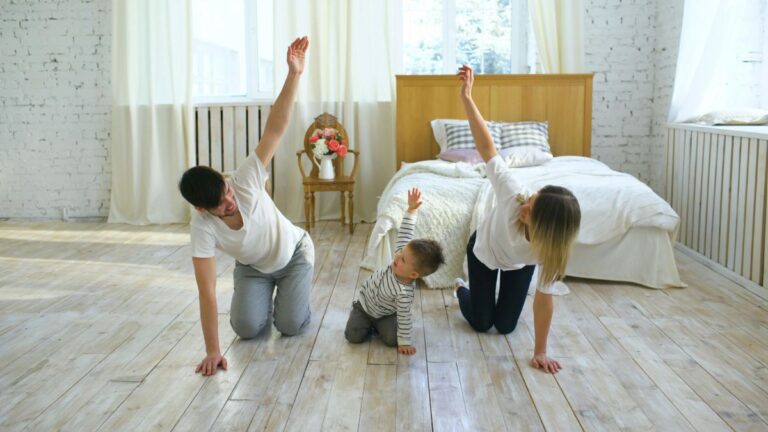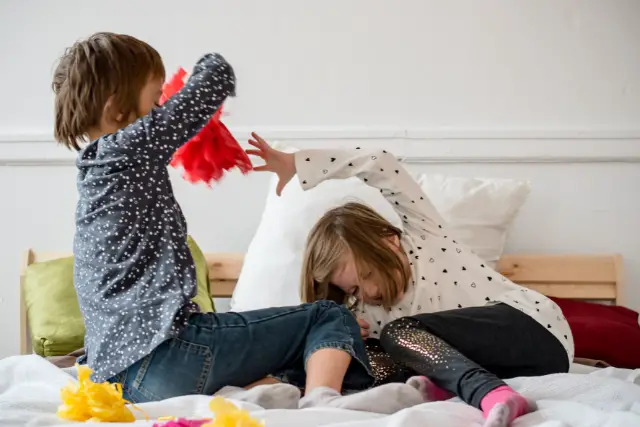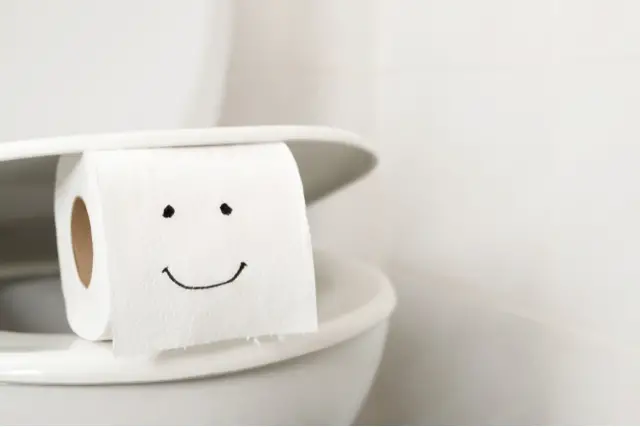How To Stop A 4-Year-Old Wetting Himself On Purpose?
Most 4-year-olds are potty trained. Of course, you don’t expect to clean up urine on the living room floor when your kid reaches this age, but you will be amazed to know how common it is for older kids to have potty accidents. But it is not natural if your 4-year-old is wetting himself on purpose. It’s not usually a physical issue but a behavioral issue.
Let’s talk in detail.
How do you know that your preschooler is wetting himself on purpose?
The very first step is to figure out if your little one is really wetting himself on purpose or if it’s just happening for another reason.
Make sure it’s not a medical condition like a UTI or something else like nighttime or daytime bedwetting. Notice whether your child is stressed. Is there a significant change in his life causing potty training regression?
How do you know that your preschooler is wetting himself on purpose?
Look for any of these signs:
- After wetting himself, he will look toward you and wants you to know that he did that.
- He shouts or tells you in advance, “I will pee in my pants.”, “I will pee on the carpet.”
- After peeing, he makes funny faces or laughs; his reaction will tell you that he did it on purpose. He will try to annoy you.
- Or, after peeing, your little one doesn’t bother. Instead, he keeps doing what he is doing.
If you see any of these things, you can tell that he is doing this on purpose. You can’t say it’s potty training regression because regression is when your child doesn’t go to the toilet because he can’t. Peeing on purpose is mostly a behavior issue that needs to be fixed positively.
Why your 4-year-old is wetting himself on purpose? – What to do to stop him?
Following are the possible reasons why your 4-years-old is wetting himself on purpose.
1- To seek attention:
This is the number one reason why a 4-years-old wets himself on purpose. Kids naturally seek parents’ attention, but today’s world is super busy. Parents hardly get time to spend with their kids. Screens are also a factor.
When you spend time with kids, you are busy on your mobile.
Some kids are naturally more attention seekers. So even if the parent gives them time, they will still want “more.”
Kids are smart. They learn to use unusual ways to get what they want. So it is possible that your little one has learned that he is getting his mommy back by wetting himself. Whether in a good mood or bad, she is here.
How do you know that this is the case?
If your child looks toward you with the expression, “Say something now.” or if he is doing this mostly when you are very busy with something, it can be an attention-seeking behavior.
Solution:
Your child is purely looking for your reaction. Whether you are mad or loving towards him, he wants to see what you do when he wets his pants.
What you can do is just don’t talk to him right away. Instead, take him to the toilet and ask him to wash, then come and clean with you.
Do not react in any way. No talking right now. Once you both are done cleaning, return to what you were doing.
Let the child understand that this is not how he will get his mommy back.
Of course, he will try to talk to you but just say, “I’m busy right now. I’ll spend time together in the evening.
Then let him play and keep an eye on his activity. When he does something good like making a figure with the lego or coloring or drawing something, give him your attention. “You are doing a great job. I’m watching you.”
He will understand that wetting didn’t work, but “this activity” worked.
After that, make sure your child is getting enough attention every day. Fix family time with no gadgets around. Be there for your children.

2- To protest against something they don’t want:
Kids will find different ways to protest against something they don’t want. They want to make the parent mad. They want you to let them do what they want.
More than saying NO all the time, they can find ways to challenge you if they don’t get listened to.
For example, you want them to go to bed, but they want to play. You pick them up and walk towards the bedroom, and they wet themselves to annoy you or stop you from doing this.
How do you know that this is the reason?
If your little one comes straight and warns you (or challenges you) if you force him to do this task, he will react this way.
“I will pee on the bed if you take me to the bedroom now.”
A clear warning or challenge. This clearly indicates that your little one is using this behavior to protest.
Solution:
This behavior can be very challenging.
Instead of pushing your child to do something, make him willing to do this.
For example, in the above case, give him a call instead of picking up the child to bed. “5 minutes before we go to bed.”
Then after some time, instead of saying “bedtime,” say “story time.”
Make the activity fun for your little one, as 4-years-old respond very well to this approach. They always want fun.
You can’t come straight onto your child and ask them to leave the activity or do something that is quite boring.
Instead, give them an alternative activity that is fun too. For example, Instead of “stop playing with the mud,” try “let’s take out our slime,” or “Who wants to get into the pool?”
And YES! Don’t stop there immediately when your little one is using “wetting himself behavior” to protest against something.
For example, when you are taking your child to bed, and he says, “I will pee on the bed if you take me to the bedroom.”
Don’t take him to the bed, and don’t turn back either. Stop there and look at him with neutral expression. “Why would you do that? Do you want to sleep in wee-wee?”
Your little one must be aggressive, and he will respond negatively.
“Calm down! Why do you not want to sleep now? Talk to me!”
Take him into the mood to talk and ensure that you are listening.
“I dont’ want to sleep right now; I want to play.” The obvious answer of the child.
“Okay! But you know it’s bedtime, and we shall sleep right now. So do you want to listen to a bedtime story instead?”
“No! I want to play only.”
“Alright, you can play until this sand timer is out. Place the timer there, and once it’s out, you can ask them to come for the story now. The child will most probably listen to you now.

Even if they don’t, turn the lights off. “Your timer is out, but don’t worry; we’ll have some fun on the bed before you sleep.
Do not accept this kind of (wetting) protest of your child. Listening to them will increase the problem, and not listening to them will make them more aggressive.
So, just try to change their mind. They should forget their protest. The best way to do this is “start talking.”
Turn on their talking mode, and always ensure that you listen to your child and communicate your point too.
Children act up when they think their parents never listen to them.
This post may contain affiliate links. Read our disclosures here.
4- They just don’t want to go to the toilet:
Another very common reason for potty accidents in older kids is “they are too busy doing something that they don’t get up to use the restroom.”
They just try to hold it at first until they are on the edge of having an accident. And then they decide that they still don’t want to get up and will pee there.
Your child knows how to get up and go to the toilet, but they wet themselves intentionally because they don’t want to leave the activity.
How do you know this is the problem?
If your child is not bothered by wetting themselves, they don’t move or stop playing; they are clearly doing this because they are busy.
Solution:
The only solution is to talk to your child. Engage her in cleaning so she takes it as a consequence “if I do this, I will have to clean it.”
Make your little one understand that this behavior is not acceptable.

What if a 4-year-old is wetting himself on purpose in school only?
If your little one is doing fine at home, but he wets himself on purpose at school; there can be the following possible reasons:
- Your child doesn’t know where to go or how to tell the teacher that he needs to go. He might not know the process or think he cannot move out of the classroom.
- Your little one is too shy to tell the teacher or school staff he must go.
- Maybe he is not comfortable using the school toilet, so he does that in class.
- The school washroom is unfamiliar
- The bathroom is not clean
- He feels uncomfortable being around other kids in the toilet.
- Someone annoys him there.
- He wants to annoy the teacher with this behavior.
Solution:
The only solution to this problem is to talk to the teacher and ask your child what is wrong—set rewards for not having a potty accident in school.
Encourage your little one to tell what was wrong. Explain to him what to do if he needs to go. Make him understand that using the school toilet is the only acceptable way.
Ask the teacher how he behaves in class. Is he shy or confident? Tell her he only has this problem in school and not at home.
You can also ask the teacher to politely ask the child what’s wrong. Hopefully, she will get the answer. Teachers are also trained to figure out and deal with this kind of behavior.
So, get in touch with the teacher and find a solution.
Bottom line:
After making sure that your 4-years-old is actually doing this on purpose, find out why he is doing so. Is it attention-seeking behavior or a kind of protest? Does your child not want to get up to go to the toilet?
Make sure to avoid yelling and creating a fuss. It’s not going to solve the problem.
Talk with the child and listen to him. Solve the problem.







